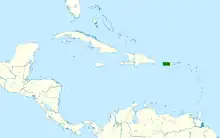Puerto Rican vireo
The Puerto Rican vireo (Vireo latimeri) is a small bird endemic to the archipelago of Puerto Rico and one of the 31 species belonging to the genus Vireo of the family Vireonidae. Its local name is bien-te-veo ("see-you-well", after the call), not to be confused with the unrelated great kiskadee - also known as bien-te-veo - which is found elsewhere.
| Puerto Rican vireo | |
|---|---|
| Scientific classification | |
| Domain: | Eukaryota |
| Kingdom: | Animalia |
| Phylum: | Chordata |
| Clade: | Dinosauria |
| Class: | Aves |
| Order: | Passeriformes |
| Family: | Vireonidae |
| Genus: | Vireo |
| Species: | V. latimeri |
| Binomial name | |
| Vireo latimeri Baird, 1866 | |
 | |
The Puerto Rican vireo has a gray head, a white breast and a yellowish belly. The species measures, on average, 12 cm (4.72 in) and weighs from 11 to 12 grams (0.388–0.423 oz).
An insectivore, the species's diet consists of grasshoppers, caterpillars, cicadas, beetles and aphids and is complemented with spiders, anoles, and berries.
From 1973 until at least 1996, the species suffered a population decline in the Guánica State Forest. The primary reason for this decline was brood parasitism by the shiny cowbird (Molothrus bonariensis).[2]
| External audio | |
|---|---|
| Bird Call | |
See also
References
- BirdLife International (2016). "Vireo latimeri". IUCN Red List of Threatened Species. 2016: e.T22705222A94006392. doi:10.2305/IUCN.UK.2016-3.RLTS.T22705222A94006392.en. Retrieved 13 November 2021.
- John Faaborg; Kate M. Dugger; Wayne J. Arendt; Bethany L. Woodworth & Michael E. Baltz (June 1997). "Population declines of the Puerto Rican Vireo in the Guánica State Forest" (PDF). Wilson Bulletin. 109 (2): 195–202. Retrieved 2006-08-15.
Further reading
- Oberle, Mark (2003). Las aves de Puerto Rico en fotografías (in Spanish). Editorial Humanitas. ISBN 0-9650104-2-2.
